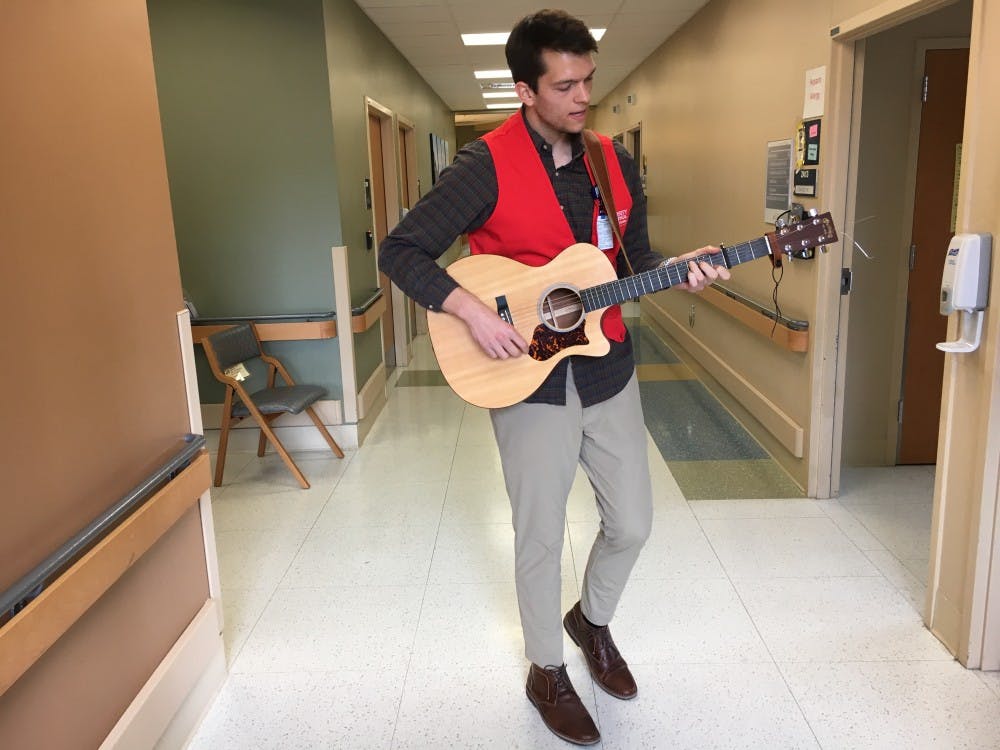When fourth-year College student Grant Frazier decided to combine his passions of music and medicine, he began working with Madison House to bring music into the hospital setting. This idea led to the creation of Harmonies for Healing, a program which sends three student musicians to the University’s Transitional Care Hospital each day with hopes of improving the lives of both patients and medical staff.
The 10-person unit ranges from first- to fourth-years, including violinists, guitarists, singers and other instrumentalists. By performing in the hallways of different hospital wings, the volunteers’ music reverberates throughout the wing for everyone to hear.
“We just try to bring a healing and warming atmosphere to the hospital … and what better way to do that than to bring [music] into a hospital setting to give to the patients,” Frazier said. “You're also having an incredible impact on the nurses and doctors and all of the staff because they're also able to hear all of the music.”
Like most programs in their beginning stages, Frazier recalls constant recruitment of volunteers leading into last year’s pilot testing. Due to the restriction of a maximum 10-person unit, the audition process is a competitive one.
Auditioners are first asked to play a selection of songs tailored to a hospital setting, followed by a set of questions which show their interest in volunteering. Frazier also asks a series of “what-if scenarios,” which target how qualified the auditioner is in the program’s specific setting. According to Frazier, the challenge is finding the right kind of musician.
“A lot of [musicians] play live shows with audiences in front of them, and everyone expects to have this incredible feedback, but when you're playing in a hospital setting you shouldn't expect anything in return,” Frazier said. “It’s really just the opportunity, and almost a responsibility, to share your gift with those who are in really dire circumstances."
Merritt Gibson, second-year College student and singer songwriter — who has also produced an album in Nashville, Tenn. — has been a part of the program since September. Because she performs original songs, singing at the Transitional Care Hospital has been more than just a way to give back.
“Usually the patients are the first ones to hear my new songs because it's just things I've been working on … so it's fun to be able to test out my new songs with them and see the reactions I get,” Gibson said.
For both Frazier and Gibson, the reactions and personal interactions they experience with patients and medical staff have been some of the most memorable moments in the program. One such moment for Frazier occurred last year, when he was playing outside the room of a patient who had been hospitalized for 40 days. The mother of the patient approached Frazier, asking him to step inside the room to play for her daughter one-on-one.
"As soon as I started singing, her face brightened up, and there was just this life that was brought back into her, and she was happy again,” Frazier said. “When I finished, the mom said that's the happiest she had been the entire time she’d been in the hospital.”
According to Hospital Volunteer Program Coordinator LaDelle Gay two to three musicians from the Charlottesville community would play for patients each week prior to the start of Harmonies for Healing. Through the work of Frazier and the other volunteers, that number has now been increased to two to three musicians a day.
“The patients, their families and guests, as well our staff, all benefit each time a musician shares their talents by playing in our hallways,” Gay said. “The cheer they provide lingers long after the musician moves on down the hall.”
After the program’s success in its pilot testing last year, Harmonies for Healing has since gained popularity amongst students. From last year to this year, audition numbers for the 10-person unit shot up from 13 to 40 students, sparking expansion plans for the coming years.
Beginning this summer, the program will expand into the Emily Couric Clinical Cancer Center as well as the pediatric unit at the University’s main hospital. The expansion means that there will soon be 30-40 musicians volunteering at one of the three locations each day.
“The music is very healing and really nice psychologically for the patients to hear some live music as opposed to just the beeping and the noise in the hospital,” Gibson said.







